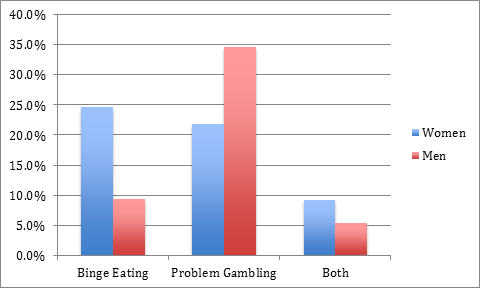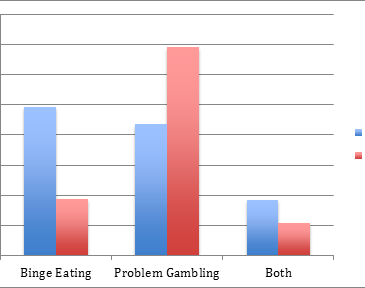Editor’s note: As part of our broader effort to streamline our science reviews, we have changed the way we provide citations to academic papers. Rather than presenting a list of references at the end of science reviews, we now link directly to published abstracts of these papers within the main text. Readers can click on these links to learn more details about the papers.
Problem gambling and binge eating disorder are serious public health concerns. Previous research has suggested that the two disorders often coexist and impulsivity might be an important link between the two. Men and women, however, may experience these disorders differently: men are more likely to struggle with gambling and women are more likely to struggle with eating disorders. Sarah Farstad and her colleagues recently examined how impulsivity relates to both binge eating and problem gambling, and how it might differ for men and women. Today we review their prospective study.
What was the research question?
What aspects of impulsiveness predict problem gambling and/or binge eating among men and women?
What did the researchers do?
Farstad and her colleagues performed a secondary analysis of data from the Leisure, Lifestyle, Lifecycle Project, a longitudinal cohort that examined gambling behaviors in Alberta, Canada. Participants (N = 1002) completed a survey that included questions from the revised NEO personality index, which assessed the following three aspects of impulsiveness:
- Negative Urgency – impulsive behavior in response to a negative emotional state;
- Sensation Seeking – chasing excitement or thrilling activities; and,
- Lack of persistence – deserting an activity if bored or tired.
About three years later, participants completed the Eating Disorder Examination-Questionnaire and the Problem Gambling Severity Index to assess binge eating episodes and problem gambling symptoms in the past 28 days months and past 12 months, respectively.
What did they find?
As in other published research, in this sample, more women than men reported binge eating and more men than women reported problem gambling (Figure). Negative urgency in women and negative urgency and lack-of-persistence in men at baseline significantly predicted binge eating at follow-up. Negative urgency in women also predicted problem gambling; however, only sensation-seeking in men predicted problem gambling. A follow up analysis that left out people who reported both binge eating and gambling problems determined that none of the aspects of impulsivity predicted reported gambling-related problems, suggesting that the link between impulsivity and problem gambling may be weaker than that for binge eating. Age also had different implications for men and women. Younger women were more likely to experience binge eating episodes, whereas older women were more likely to experience symptoms of problem gambling. There were no significant correlations between age and either disorder for men.

Figure. The percentage of women and men who reported binge eating episodes and problem gambling symptoms at the 3-year follow up interview. Click image to enlarge.
Why do these findings matter?
These results have implications for treatment strategy because providers might need to address different aspects of impulsiveness depending upon gender and type of problem. For women, both disorders were associated with negative urgency whereas for men each disorder was associated with a different aspect of impulsivity or not significantly associated with impulsivity at all. Clearly, there are gender-specific implications for using impulsivity as a marker for either disorder. Men and women also tend to experience binge eating and problem gambling at different rates and at different ages. Developing gender-specific treatment might be necessary to address these differences.
Every study has limitations. What were the limitations in this study?
This study only examined three aspects of impulsiveness and only asked about recent binge eating and problem gambling through self-report measures. Participants also reported binge eating episodes and problem gambling symptoms for two different time periods, which might have impacted the relationship between them and to impulsivity. Future research should examine additional facets of impulsiveness and look at lifetime prevalence of binge eating and problem gambling to provide a more thorough evaluation of impulsiveness in these behaviors. Additionally, this sample represented a mostly white and well-educated population from Alberta, Canada and might not be applicable to other populations.
For more information:
Find the original publication abstract here. Worried you or a loved one has a gambling problem? Check out the National Center for Responsible Gambling website for screening tools and resources. For more information and resources for binge eating and other eating disorders, visit the National Eating Disorders Association website.
— Layne Keating
What do you think? Please use the comment link below to provide feedback on this article.




